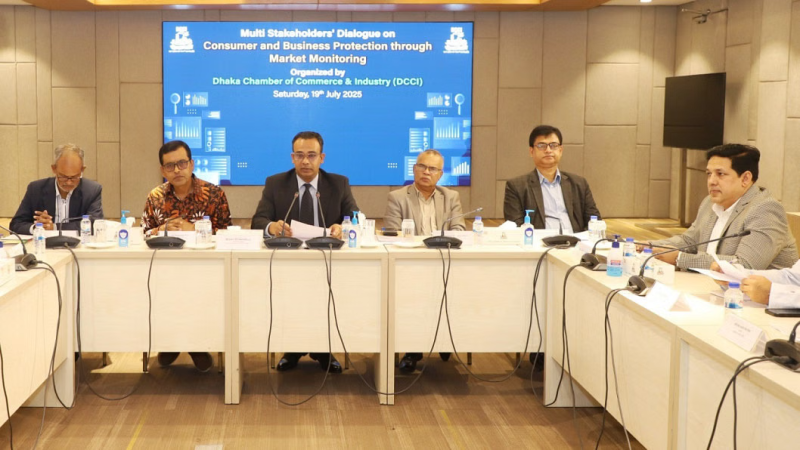- India Sees 9% Drop in Foreign Tourists as Bangladesh Visits Plunge |
- Dhaka Urges Restraint in Pakistan-Afghan War |
- Guterres Urges Action on Safe Migration Pact |
- OpenAI Raises $110B in Amazon-Led Funding |
- Puppet show enchants Children as Boi Mela comes alive on day 2 |
Poor Oversight Blamed for Essential Commodity Price Hikes

Consumers and businesses alike are struggling with sharp increases in essential commodity prices, largely due to poor market monitoring, artificial crises, extortion, transportation insecurity, and import complications, analysts said on Saturday.
A shortage of storage facilities, lack of trust between traders and consumers, and insufficient competition in the market are also contributing to the problem, they added.
Their observations came during a multi-stakeholder dialogue on consumer and business protection through market monitoring, organised by the Dhaka Chamber of Commerce and Industry (DCCI) in Dhaka.
DCCI acting president Razeev H Chowdhury said that despite growing economic activities, both consumers and small enterprises are facing constant challenges. Price manipulation, artificial shortages, poor product quality, regulatory barriers, and market harassment are damaging consumer confidence and harming ethical businesses, he noted.
To address the situation, he called for an integrated framework for market supervision and the creation of a transparent and accountable monitoring system.
Mohammed Alim Akhter Khan, director general of the Directorate of National Consumers' Right Protection (DNCRP), said effective market supervision is critical, but highlighted staffing shortages—officers are absent in 19 district offices nationwide.
Md Shahjahan Mia, administrator of Dhaka South City Corporation, said middlemen involved in goods transport and market management are pushing prices higher, hurting consumers. He added that a few dishonest businesses are damaging the reputation of ethical traders.
Professor Mohammad Shoeb of the Bangladesh Food Safety Authority stressed the need to modernise market monitoring using advanced technologies and updated data.
Mohammad Golam Mowla, general secretary of the Moulvibazar Traders Association, pointed out that many government sugar mills have closed, leading to increased reliance on imports and limited competition in the sugar and edible oil markets.
Khandaker Monir Ahmed, senior vice president of the Bangladesh Poultry Industries Association, suggested setting up egg storage facilities to help stabilise prices during peak seasons.
Abul Hashem, president of the Sugar and Oil Traders Association, urged the government to reopen closed sugar mills, either through public initiatives or in partnership with the private sector, to reduce import dependence and ensure fair competition.
Finally, Kazi Mohammad Bashir Uddin, president of the Moulvibazar Traders' Association, said imposing fines alone is not enough to curb market irregularities. He called for strict, exemplary punishments to restore discipline and protect consumers.

